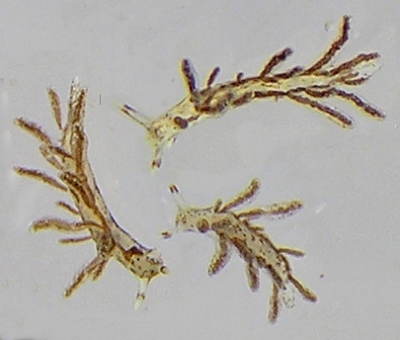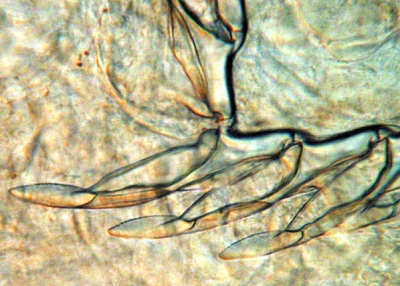

Stiliger berghi
Baba, 1937
Order: SACOGLOSSA
Superfamily: LIMAPONTIOIDEA
Family: Limapontiidae
DISTRIBUTION
Known from nthn Japan and Peter the Great Bay, Russia.
PHOTO
Peter the Great Bay, intertidal, Russia, Pacific Ocean, 21 July 2007, on Neorhodomela larix. Length: 3-5 mm. Photographer: A.V. Chernyshev.
Small sacoglossans with a row of irregularly arranged, and irregularly sized cerata down each side of the body. The rhinophores are tapering and cylindrical. The body wall is transparent with scattered brown patches of irregular size and shape. Smilar spots are found on the cerata, and the rhinophores have a dark brown band about one-third of the way down from the tip. The digestive gland ducts are dark brown.
Although the radular teeth are described as non-denticulate (Baba, 1937), Alexei Chernyshev [message #21055] reports fine denticles along the edge of the blade. He notes that it is a common species in Peter the Great Bay (Japan Sea) and lives and feeds on red algae, especially on Neorhodomela larix. It grows to about 5 mm in length.
-
Baba, K. (1937) Opisthobranchia of Japan (I). J. Dept. Agric. Kyusyu Imp. Univ. 5(4): 195-236. (Pl.4)
Rudman, W.B., 2008 (March 27) Stiliger berghi Baba, 1937. [In] Sea Slug Forum. Australian Museum, Sydney. Available from http://www.seaslugforum.net/find/stilberg
Related messages
Copulating Stiliger berghi from Vostok Bay, Russia
April 13, 2010
From: Alexei Chernyshev


Dear Bill,
Here are photos of a copulating pair of Stiliger berghi and the egg mass of one specimen.
Locality: Vostok Bay, intertidal, Russia, Pacific Ocean, Japan Sea, 22 July 2008, on Polysiphonia. Length: 3-4 mm. Photographer: A. Chernyshev.
Sincerely yours,
Alexei Chernyshev
tsher@bio.dvgu.ru
Chernyshev, A.V., 2010 (Apr 13) Copulating Stiliger berghi from Vostok Bay, Russia. [Message in] Sea Slug Forum. Australian Museum, Sydney. Available from http://www.seaslugforum.net/find/23439
Thanks Alexei,
Bill Rudman
Re: Stiliger berghi Baba, 1937 from the Japan Sea
April 14, 2008
From: Cynthia Trowbridge
Concerning message #21055:
Dear Alexei and Bill,
I am in Japan right now to give a presentation this weekend on Stiliger berghi at the Japanese Malacological Society (Trowbridge, Hirano & Hirano). I just came across the Russian report of S. berghi -- what timing!
We have a ms on the species in The Veliger with SEM photos of the teeth. Under the light microscope, the teeth look non-denticulate but under SEM they are very clearly denticulate.
We have spent several years working on this species (Honshu and Hokkaido). I do not believe the species feeds on Neorhodomela but rather on Polysiphonia, Dasya, and Ceramium... such filamentous red algae may grow on Neorhodomela but the latter is not a sacoglossan food. (I have worked on Neorhodomela larix for many years in Oregon, its chemical ecology, grazers, etc.).
Beautiful photos! It is wonderful to see another Russian report of this species.
Cordially,
Cynthia
trowbric@onid.orst.edu
Trowbridge, C.D., 2008 (Apr 14) Re: Stiliger berghi Baba, 1937 from the Japan Sea. [Message in] Sea Slug Forum. Australian Museum, Sydney. Available from http://www.seaslugforum.net/find/21522Dear Cynthia,
Thanks for the background information. Contributions from you and the Hiranos are always welcome
Best wishes,
Bill Rudman
Stiliger berghi Baba, 1937 from the Japan Sea
March 27, 2008
From: Alexei Chernyshev


Stiliger berghi Baba, 1937 is a common species in Peter the Great Bay (Japan Sea). This species possesses finely denticulate radular teeth and finger-shaped rhinophores. It lives and feeds on red algae, especially on Neorhodomela larix.
Locality: Peter the Great Bay, intertidal, Russia, Pacific Ocean, 21 July 2007, on Neorhodomela larix. Length: 3-5 mm. Photographer: A.V. Chernyshev.
Alexei Chernyshev
tsher@bio.dvgu.ru
Chernyshev, A.V., 2008 (Mar 27) Stiliger berghi Baba, 1937 from the Japan Sea. [Message in] Sea Slug Forum. Australian Museum, Sydney. Available from http://www.seaslugforum.net/find/21055
Thanks Alexei,
It's nice to get some photos of this species , which is certainly unfamilar to me. Your radular mount is almost identical to Baba's original drawing, but he describes the blade as 'non-denticulated'. I can only presume you have better optical equipment available than Baba did at that time. Another point of similarity is his description of the 'dark mottles' scattered over the body and cerata, and the rhinophores having a 'dark ring down the tip'.
Best wishes,
Bill Rudman
